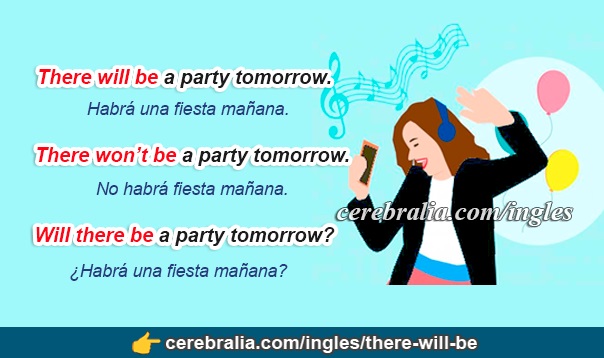Comparte en:
There will be
(Habrá)
En las lecciones anteriores vimos there is y there are para indicar que «hay» algo, tanto singular como en plural. También vimos there was y there were, para indicar que «hubo» o «había» algo, tanto para singular y plural respectivamente.
Y ahora, en esta lección veremos el futuro de hay, que en español se dice habrá, cuya equivalencia en inglés es «there will be». Nota que este se forma con there seguido del verbo to be en futuro will be.
A diferencia del tiempo presente y pasado, en el tiempo futuro no hay diferencia entre singular o plural. Siempre se utiliza «there will be» para ambos.
A continuación verás su estructura gramatical en oraciones afirmativas, negativas e interrogativas y también varios ejemplos de oraciones.
| Oraciones afirmativas | Oraciones negativas | Oraciones interrogativas |
|---|---|---|
| There will be | There will not be = There won't be | Will there be? |
Oraciones afirmativas:
Para formar oraciones afirmativas, usamos la siguiente estructura «there + will + be» + complemento directo. Ejemplos:
- There will be a party tonight.
(Habrá una fiesta esta noche) - There will be a meeting on Friday.
(Habrá una reunión el viernes) - There will be a full moon tomorrow.
(Mañana habrá luna llena) - There will be more students next year.
(Habrá más estudiantes el próximo año) - There will be some shops open tomorrow.
(Habrá algunas tiendas abiertas mañana) - There will be a lot of people at the beach this summer.
(Habrá mucha gente en la playa este verano)
Oraciones negativas:
Para formar oraciones negativas, basta con añadir la negación «not» inmediatamente después del auxiliar «will» o usar su contracción «won't». Ejemplos:
- There won't be a party tonight.
(No habrá fiesta esta noche) - There won't be a meeting on Friday.
(No habrá reunión el viernes) - There won't be a full moon tomorrow.
(Mañana no habrá luna llena) - There won't be more students next year.
(No habrá más estudiantes el próximo año) - There won't be any shops open tomorrow.
(No habrá ninguna tienda abierta mañana) - There won't be many people at the beach this summer.
(No habrá mucha gente en la playa este verano)
Oraciones interrogativas:
Para formar cualquier pregunta en inglés, basta con invertir el orden de la estructura de las frases afirmativas y colocar el auxiliar «will» delante del sujeto. Ejemplos:
- Will there be a party tonight?
¿Habrá una fiesta esta noche? - Will there be a meeting on Friday?
¿Habrá una reunión el viernes? - Will there be more students next year?
¿Habrá más estudiantes el próximo año? - Will there be a full moon tomorrow?
¿Habrá luna llena mañana? - Will there be any shops open tomorrow?
¿Habrá tiendas abiertas mañana? - Will there be many people at the beach this summer?
¿Habrá mucha gente en la playa este verano?

✅ Ahora veamos cómo responder a las preguntas. Si alguien te pregunta en inglés ¿Habrá payasos en tu fiesta de cumpleaños? te dirá: Will there be any clowns at your birthday party?
➤ Respuesta afirmativa:
- Yes, there will.
(Sí.) - Yes, there will be some clowns at my birthday party.
(Sí, habrá algunos payasos en mi fiesta de cumpleaños)
➤ Respuesta negativa:
- No, there won't.
(No.) - No, there won't be any clowns at my birthday party.
(No, no habrá payasos en mi fiesta de cumpleaños) - No, there will be no clowns at my birthday party.
(No, no habrá payasos en mi fiesta de cumpleaños)
🥇 Sigue aprendiendo: 🙂
✅ Cómo usar THERE IS y THERE ARE
✅ Cómo usar THERE WAS y THERE WERE
✅ ¿Cómo se usa SOME y ANY en inglés?
✅ ¿Cómo se usa A LITTLE y A FEW en inglés?
✅ Aprende a usar MUCH, MANY, A LOT OF en inglés
✅ Los sustantivos contables e incontables en inglés
✅ Canciones en inglés traducidas al español 🎵

